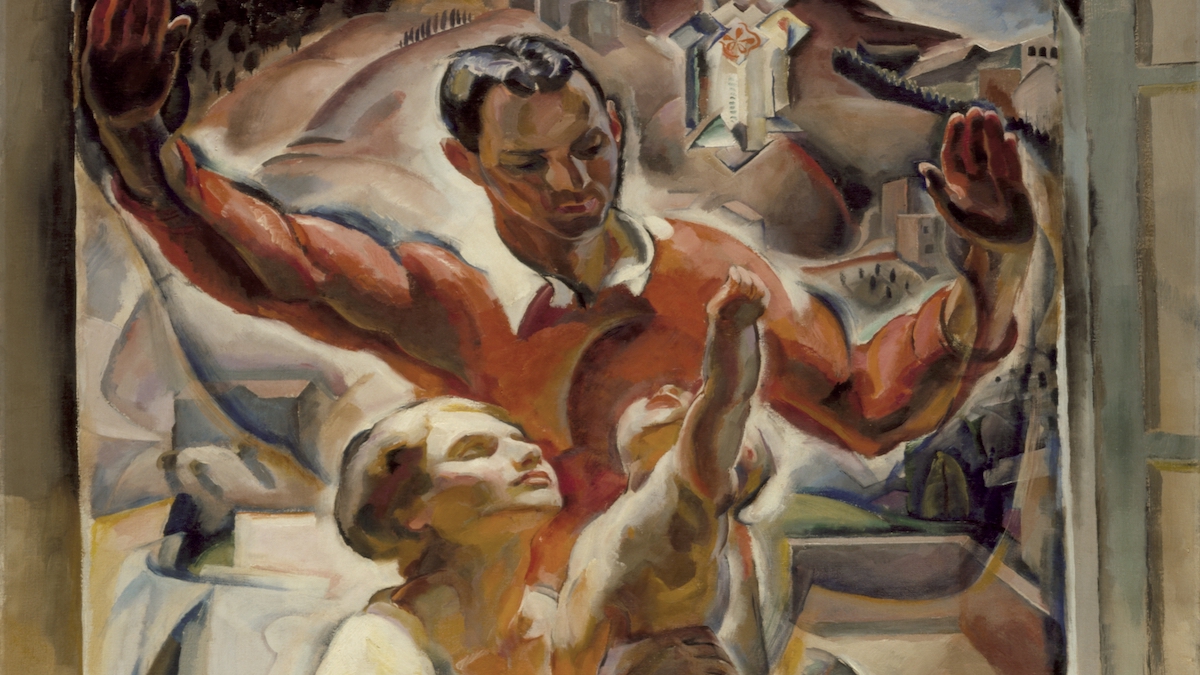In a strange update to the old feminist slogan, some pugilists on the left and the right are converging on the argument that kids need a dad like a fish needs a bicycle.
For tradder-than-thou influencers, the claim is an inadvertent one. Men and women in this subculture argue that fathers should never change diapers, because caring for children is emasculating. This reduces a father to a paycheck, not a parent. For those on the left, assisted reproduction has treated severing the ties among mother, father, and child as an intellectual and practical challenge. As long as genetic gaps can be covered with donated gametes or paid surrogates, every parent is replaceable.
Richard Reeves, the author of Of Boys and Men, has been making the persuasive case that we undervalue the need for men to be present as men. When professions like pediatricians, elementary school teachers, and psychologists become intensely female-skewed, boys wind up shortchanged. That made it very odd when, on Father’s Day, he made the case that we should lower our expectations for how a father is present. As Reeves sees it, many of the men who father children will never be dads in the way we’ve understood the role. For Reeves, this means we have to come up with a broader understanding of what a “good father” looks like.
In an essay titled, “Why fatherhood and marriage don’t have to go together,” Reeves argued for what is essentially a harm reduction approach to men and fatherhood. Reeves worries that marriage and family life is already off the table for many men who have fathered children, and he wants to set a goal they can actually reach, lest they give up in despair. As he puts it, “If you have to be a husband to be a good Dad, what does that mean for the tens of millions of fathers who are not married, or who were and are not anymore? … If we’re not careful, the message is: You failed. You’re benched. You don’t matter anymore.”
Reeves’s prescription is backwards looking, trying to figure out how to best serve the men who have already fathered children outside of marriage or gotten divorced. For some of these men, it truly is impossible to regularize their situations—if they have fathered children with multiple women, it is impossible for them to fully keep the promise of family for all of their children simultaneously.
I don’t object to encouraging men to make the biggest commitment they can, even if the best is off the table. But, for the sake of comforting men who have already fallen short, Reeves is shortchanging young men and boys who need to hear that fatherhood is a necessary and noble (though hard) calling. Men need to know what they can uniquely contribute to their family. The abiding presence of a father isn’t replaceable by their paycheck, their banked sperm, or their weekend visits. Men and women both are impeded in knowing themselves and the full potential of their relationship when fathers are treated as trivial.
Rituals, Responsibility, and Risk
Leon and Amy Kass, married philosophers who wrote together on courtship and marriage, observed that men more than women need an external, ritual confirmation of their commitment. Because of men and women’s reproductive asymmetry, women always have more at stake bodily in a romantic or sexual relationship. Men need a way to affirmatively opt-into the risk that women bear naturally, and that choice needs cultural heft.
The Kasses saw one, fading, way of recognizing this choice in the traditional practice of men giving their names to their wives and, eventually, their children. The gift of a name is sometimes discussed as the erasure of the woman’s name. It can feel like a more brute act of claiming or owning if it isn’t recognized in the way the Kasses think it should be understood—as an active step into vulnerability and responsibility. In “What’s Your Name?” the Kasses wrote:
The husband who gives his name to his bride in marriage is thus not just keeping his own; he is owning up to what it means to have been given a family and a family name by his own father—he is living out his destiny to be a father by saying yes to it in advance. And the wife does not so much surrender her name as she accepts the gift of his, given and received as a pledge of (among other things) loyal and responsible fatherhood for her children. … Patrilineal surnames are, in truth, less a sign of paternal prerogative than of paternal duty and professed commitment.
The traditional naming convention makes little sense if it isn’t understood as a risky gift, a way of pushing all your chips into the center of the table. Expectations for married life are set during courtship and dating. The early parts of a relationship can quickly feel thin and thwarted without a strong sense of the potential promise the partners are considering. A man and woman are weighing whether to sail over the edge of the of the map into that the uncertain territory marked “for better and for worse.”
The False Mercy of Low Expectations
In “The Paradox of Slow Love” in The Atlantic, Anastasia Berg and Rachel Wiseman explored how women respond when they don’t expect the men in their social circles to be prepared for fatherhood. In surveys and in-depth interviews, women admitted to approaching their romantic relationships slowly, gingerly, waiting for men to catch up and be ready for commitment.
Berg and Wiseman discuss a 2018 series of interviews with women who use egg freezing to try to remove the pressure of children and fatherhood from the men that they date. Putting fertility on ice makes them feel more prepared to court men, because it removes the time pressure to match before their fertility dips. But they also elect egg freezing as a way of making themselves more attractive to men. As Berg and Wiseman summarize it, “[the women] also fear that wanting to have children in the near or medium term will render them less attractive.”
Presumably they could cite Reeves for a similar sort of reassuring effect. But the underlying assumption is that men do not long to be fathers, and do not find a woman judging him to be good potential father as attractive. Coupling without consideration of the risk of paternity means that men receive the positive feedback of being found attractive without the actual approval it historically connoted.
Setting the bar lower for men as fathers will accelerate the lowering of expectations men are held to in dating. Making the bar easier to clear isn’t a comfort to men in the long term, but a sign that they are superfluous. If a man isn’t judged as a father, he can’t be found wanting, but he also can’t be fully valued. It’s important to say, honestly, that being a father is something a man can fail at, and that his failure has consequence.
Sometimes we make a mistake that we can’t fully put right. It’s a false mercy to try to deny the wrong for the sake of encouraging the person who committed it. The fact that the wrong can’t be undone doesn’t mean it’s impossible to make better or worse choices in the world your choice has made. And trying to live within the lie that claims everything is fully recoverable takes a toll, for parents and children.
Acknowledging What Is Lost
When I shared Reeves’s essay and some of my critique with the readers of Other Feminisms, some of the commenters were wholeheartedly grateful that their dads found ways to keep a commitment to them, even if it wasn’t the fullness of marriage and family life. Missy, whose parents divorced when she was eight, wrote,
My dad went out of his way to stay faithful to his commitment to me. He called me every night. This is before cell phones. He traveled frequently for work. So every night, we would arrange when he would call the next day. I would have to be at my mom’s home to pick up the call (which probably kept me safe more than I knew during my angsty teen years). He would have to find a landline at whatever hotel, conference center, etc. he was at and duck out of business dinners to call his daughter. His fidelity to those phone calls has stayed with me my whole life. Physical presence doesn’t necessarily mean actual presence and vice versa.
But for one commenter, posting as “Gabs,” it was frustrating to lose all the little, every day, unchosen moments with her dad. She saw herself as worse off when her father moved out, even though her parents had lived a strained life together as they planned the logistics of their separation.
I have no illusions about the fact that they are better as friends than as a couple. And yet, nothing really makes up for having your family be the people you wake up to everyday as a kid/teen and laugh/cry/scream at/bicker with every day. My dad is someone I could and can always call to for help at any time. But those boring, dead, average moments each day are gone. Yes, intentional time with my kids is important and I try to be present, but I know from having had that experience growing up that being together in the same house is itself a gift, as opposed to this ‘now I go to dad’s house, I better make it count’ or ‘I better bring my best self because this is our limited time together.’ I know it sounds stupid, but families should be under the same roof.
Gabs was grateful for what her father chose to do outside of the structure of the family, but she and her father wouldn’t be well served by Reeves’s delicacy about whether she’s allowed to acknowledge what she lost.
Soldiers experience moral injury when they’re told that their killings have no weight as long as they were following the rules. Men are also shortchanged if they’re told that when they do the best they can now, they are not shortchanging their partners or their children. Grieving what is left undone is part of valuing what men must do.
Fathers who are pulled between multiple families should do the best they can for each of their children. But preventing future fathers and their children from being torn apart means telling men and women, at every stage of life, how precious family life is, and how much men, women, and children lose when married fatherhood is treated as an optional extra.
Men and women should be frank and open, from the very beginning of a relationship, that they aim to ask a lot of each other. Men should see it as emasculating to not be evaluated for their potential as a father. True manhood is being present and depended on, not discardable.
Don’t miss Richard Reeves’ response to this essay: “Married or Not, Fathers Are Essential.“



